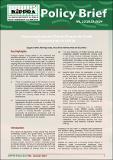| dc.description.abstract | The urgency of addressing climate change has become
increasingly evident, and global efforts, as epitomized
by the Conference of the Parties (COP), play a pivotal
role. COP28 presents a crucial opportunity to reinforce
commitments towards sustainable practices and
inclusive policies. Amidst the myriad challenges posed
by climate change, the focus on empowering youth has
gained prominence. Recognizing the potential of young
individuals as catalysts for change, there is a growing contributing to sustainable development. According
to UNICEF (2023), a mere 4.2 per cent of the total
climate finance is directed towards youth, despite youth
constituting a quarter of the global population, totalling
1.8 billion. The problem stems from systemic barriers and
a lack of dedicated mechanisms that comprehensively
engage youth in the financial aspects of climate initiatives.
Financial resources allocated for climate action often
bypass opportunities for meaningful youth participation,
hindering the development and implementation of policies
that align with the diverse needs and innovative solutions
youth can bring to the table. Youth, who represent a
substantial portion of the global population, face systemic
barriers in accessing climate finance opportunities,
limiting their capacity to engage in climate-resilient
projects and initiatives (GCA, 2019). Additionally, the
International Finance Corporation (IFC) reports that lack
of tailored financial instruments and support mechanisms
for youth-led climate initiatives contributes to the underrepresentation
of young entrepreneurs in the climate
finance landscape (IFC, 2021). | en |



